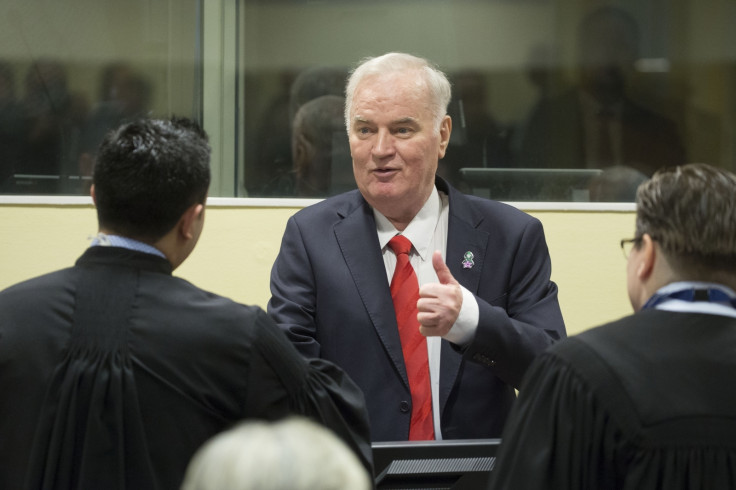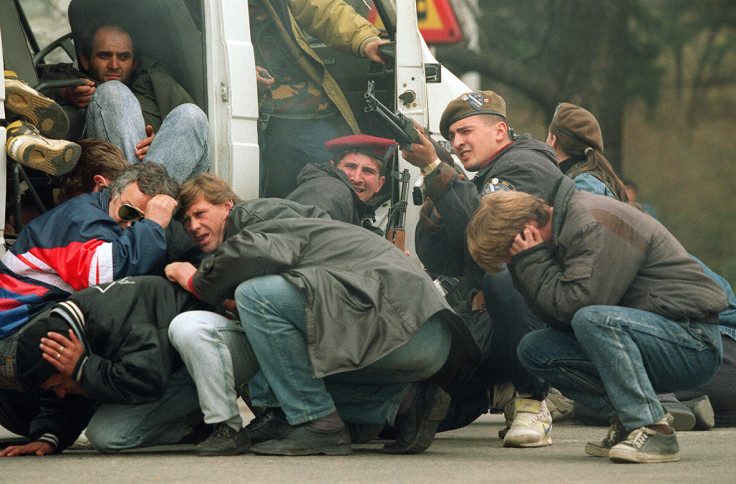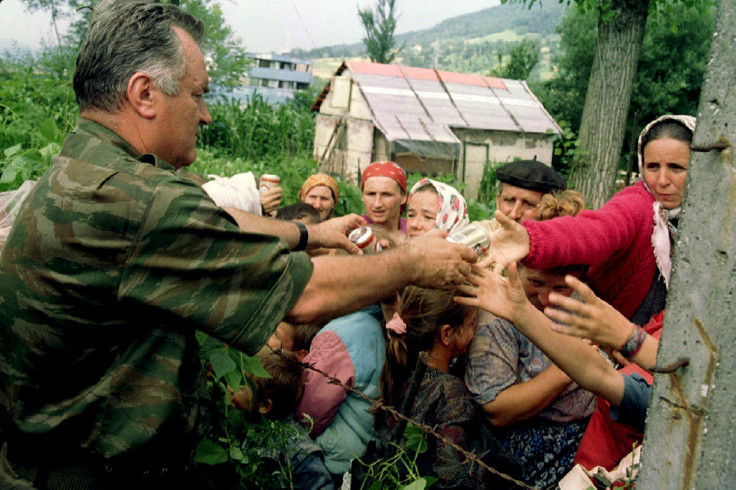'Butcher of Bosnia' Ratko Mladic guilty of Europe's biggest genocide since the Nazis
KEY POINTS
- Former Bosnian Serb general guilty of masterminding killing of 8000 Muslim men and children in Srebrenica.
- Also found to have "personally" directed the shelling of thousands of civilians in Sarajevo.
- "Butcher of Bosnia" handed life sentence.
Ratko Mladic, the former Bosnian Serb general nicknamed the "Butcher of Bosnia", has been found guilty of crimes against humanity and genocide over his roles in some of worst atrocities committed during the Bosnian war.
Mladic, who was the Bosnian Serb army commander during the eastern Europe war between 1992-95, was accused of 11 counts of genocide, crimes against humanity and war crimes following his roles in the biggest mass killings to occur in Europe since the Second World War.
The accusations included masterminding the July 1995 massacre of 8,000 Muslim men and children in the eastern enclave of Srebrenica, the biggest genocide to occur in Europe since the Nazi Germany era, as well as the gruelling three-year siege of Sarajevo in which 11,000 civilians died from shelling and sniper fire.
The verdict was handed down to the 74-year-old at a United Nations war crimes tribunal in the Hague following a mammoth trial lasting nearly five years.
The trial was frequently delayed due to Mladic's ill health, with his defence team previously using his condition as grounds to throw the trial out.
The verdict themselves were delayed as Mladic, who has suffered from at least three strokes, had his blood pressure taken in the court and left to visit the bathroom.
He was then removed from the purposely set up court formally known as the International Criminal Tribunal for the Former Yugoslavia after he began shouting at the judges at the after they rejected a request to adjourn the session.
After being convicted of all but one of the charges, Mladic was then handed a life sentenced by the three judges.
Prosecutor Alan Tieger previously said anything other than a life term else "would be an insult to victims and an affront to justice".
Srebrenica, near Bosnia's eastern border with Serbia, had been designated a "safe area" by the United Nations and was defended by lightly armed peacekeepers during the war.
The same peacekeepers surrendered when Mladic's force's stormed into Srebrenica in July 1995 and looked on helplessly as the mass killings commenced.

Munira Subasic of the Mothers of Srebrenica group told Reuters: "He was giving away chocolate and sweets to the children while the cameras were rolling, telling us nothing will happen and that we have no reason to be afraid.
"After the cameras left he gave an order to kill whoever could be killed, rape whoever could be raped and finally he ordered us all to be banished and chased out of Srebrenica, so he could make an 'ethnically clean' city'".
Former Bosnian Serb leader Radovan Karadzic was previously found guilty of war crimes for his role in the mass killings at Sbrebrenica, as well as the direct involvement during the siege of Sarajevo.
Mladic was indicted alongside Karadzic in 1995, but evaded capture until 2011, becoming the world's most wanted man in the process.
During the mammoth trial, prosecutors said the ultimate plan by Mladic, Karadzic and former Serbian President Slobodan Milosevic was to "ethnically cleanse" Bosnia of non-Serbs and carve out a "Greater Serbia" in the wake of the breakup of Yugoslavia.
Milosevic died in his UN cell in 2006 before tribunal judges could reach verdicts in his trial.

Mladic is still considered a hero in the Serb sector of Bosnia despite two decades of genocide and war crime accusations. Street signs still display his name in the tiny village of Bozanovici where he was born, with every home baring his portrait.
Prior to the genocide verdict, Zoran Mladic, one of several villagers who identify themselves as cousins of the ex-general, said: "He did not do such things. Others did it. The general is a colossus, a great and good man."
Mladen Grujicic, the Serb nationalist who is the current mayor of Srebrenica, has also refused to class the 1995 mass killings as a genocide.







